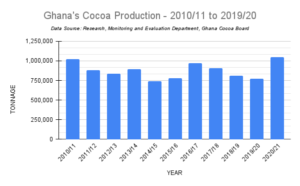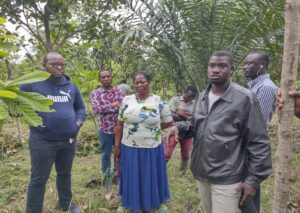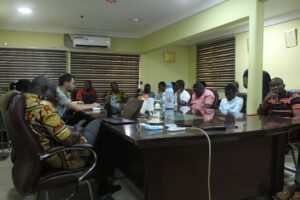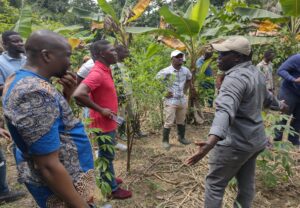For a record time, Ghana’s cocoa yields for the 2020-21 crop year soared to over one million tonnes, according to data from the Research, Monitoring and Evaluation Department of the Ghana Cocoa Board (COCOBOD). This is after nine years of turbulent annual production since the crop year 2010/11, with an annual production figure averaging 842,891 tonnes. The recent feat, which could be attributed to multiple interventions and reforms in the cocoa sub-sector, is quite remarkable, especially given that it took place in this pandemic era, when several sectors of Ghana’s economy emerged from the ruins caused by the novel coronavirus (COVID-19).

Cocoa production, by all accounts, has been the backbone of the Ghanaian economy, contributing significantly to the country’s total foreign exchange earnings while also employing an estimated 800,000 farmers – making a crucial contribution to poverty alleviation in the country. The commodity accounts for about 30 percent of Ghana’s total foreign exchange earnings while helping to retain a market share of 20 percent for the second highest producer.
Cocoa is said to be the only commodity that Ghana retains 100 percent of all foreign exchange. In 2022, cocoa is expected to contribute GH₵3.41billion to Ghana’s Gross Domestic Product (GDP). The value was measured at GH₵2.82billion (roughly US$375million) in 2020, data from Statista shows. Furthermore, the agricultural product was expected to account for GH₵4.01billion of GDP by 2025, the highest contribution within the observation period.
Regardless, the cocoa sub-sector is plagued with several challenges that make most of the gains made unsustainable unless the country fully addresses them. In addition to the issues of aging cocoa farms and farmers, cocoa farmers’ income levels, child labour, pests and other factors affecting cocoa growth in many growing regions, the widespread incidents of ‘Galamsey’ activities taking over cocoa lands, as well as the slow adoption of advanced agronomic practices, and low youth participation in cocoa farming pose a significant threat to Ghana’s cocoa productivity.
This, for instance, is highlighted by the World Bank in its ‘3rd Ghana Economic Update’ in 2018, which called for new measures to improve and achieve cocoa sustainability. “To sustain the productivity of the sector, there is a need to improve productive and social infrastructures in the cocoa producing areas, and strengthen the role of women and youth in the sector, while adhering to international commitments restricting the use of child labour in cocoa production.”
In this context, the efforts of all stakeholders must be consciously considered and supported in order to overcome these challenges and ultimately create the platform for sustainable cocoa production. But the key to these discussions is to add value to the commodity while enabling and encouraging the participation of young people based on digitisation and, to a large extent, technology.
To this end, the International Trade Centre (ITC) is implementing a programme called the Netherlands Trust Fund (NTF) V project, in partnership with the Ministry of Foreign Affairs (MOFA) of the Netherlands, which commenced in July 2021 and is expected to end in June 2025.

The NTF V programme’s ambition is to contribute to rebuilding back better in the targetted countries with a focus on MSMEs in the technologies and agribusiness sectors, linking up both for synergies and business opportunities. The programme covers both sectors in Ethiopia, Ghana, Senegal and the digital technologies sector in Benin, Côte d’Ivoire, Mali and Uganda.
The NTF V programme consist of two components, namely the digital technology sector and the agribusiness service sector.
In the digital technology sector, the NTF V programme activities will focus on building more business-friendly tech ecosystems in particular, strengthening support organisations – such as tech hubs, equipping tech start-ups and MSMEs with resilient business models, linking them to business and investment opportunities and digitalisation of traditional MSMEs.
The Agribusiness services sector, on the other hand, will focus on identifying resilient and sustainable business and production models, strengthening public-private alliances and support ecosystems, building capacity for value chain operations in areas such as market development, climate smart operations, value addition, quality, access to finance, digitalisation and developing investment strategies to ensure leveraging of investment consistently with the ITC Alliances for Action (A4A) initiative.
Overall, the NTF V programme particularly targets to promote more efficient and sustainable agribusiness and support services through digitalisation, which will lead to increased trade, better incomes and livelihood opportunities, especially for smallholder cocoa farmers.
“In order to build a scalable digital ecosystem in the last mile of agricultural value chains, Agritech and start-ups particularly in the digital technology component within the NTF V project need to understand the pain points of smallholder farmers and agribusinesses across the cocoa supply chain, and develop digital solutions to address these challenges,” a concept document of the programme noted.

The National Coordinator for ITC’s Alliances for Action Programmes in Ghana, Lawrence Attipoe, reiterated this when he said that the prospects for cocoa production are good, especially if young people can be encouraged to get involved in the processing and marketing of secondary and tertiary products from the cocoa beans.
He asserts that just exporting cocoa beans alone was not profitable for us as a country. He believes that Ghana has a huge growing middle-class population that likes very good things like chocolate products, and so instead of importing foreign chocolates, Ghana’s cocoa can be processed into quality chocolates.
“I am very happy to say that several young people, especially women, are breaking this chain. These Agritech guys can look into that given that there is a huge value chain for cocoa and cocoa beans in the country. How can we use digital IT surveys to expand this value chain to explore it? And on the other hand, how can we use IT services to increase growth and tend the harvest?”
As cocoa is an important crop and a significant contributor to the GDP of the country, he continued: “there are digital opportunities along the value chain for the youth to explore. There is opportunity for extremely technological, IT-based processes to digitise different technical activities in the cocoa value chain at the farmer level. In the cocoa value chain, for instance, the marketing component which makes the product known to the consumers seems to have a lot of potential. The youth can research and develop a digital marketplace such as an e-commerce platform that allow businesses, individuals and local processors to export their processed chocolate with the assistance of delivery services without the need for customers to fly in to make purchases. Unfortunately, the majority of young people are unaware of these opportunities”.
The cocoa market is typically a people’s market, meaning that face-to-face contact and long-term trade relationships are very common. That means that cocoa beans are normally not sold through online transactions. Nevertheless, digital marketplaces and digital trade fairs might be an interesting opportunity to showcase products, assess competition and expand buyer networks.
Mr. Attipoe, who was speaking in an interview during a field visit of agri-tech MSMEs to some cocoa areas in the Western North Region, stressed the need for such hands-on engagement in the value chain, which he dubbed: ‘From Bean to Bar’.

The tour to the cocoa fields, he asserted “would provide the agritech start-ups an excellent opportunity to learn the cocoa value chain and identify methods to deliver solutions to alleviate the multiple difficulties in the value chain.” He argues that investing in Information Technology is the best move since it will address a wide range of issues, especially if done strategically and thoroughly.
Meanwhile, as part of the Alliance for Action initiative in Ghana, ITC is also supporting farmers to develop sustainable farming practices through the Sankofa project. The Sankofa project is a multi-stakeholder project implemented with other partners such as Kuapa Kokoo Farmers and Marketing Union, Fairtrade Africa, HALBA, Max Havelaar Foundation Switzerland, World Wild Life Foundation (WWF) Switzerland, ECOTOP Suisse GmbH, South Pole, Nature & Development Foundation (NDF), and Yam Development Council.
The Sankofa project contributes enormously to the income of over 2,900 cocoa farmers in some cocoa-growing regions of the country. The overall impact of the Sankofa project is to provide a living income and improved resilience for farmers, through the sale of cocoa and associated crops.
Field Coordinator of the Sankofa project, Gottfried Baidoo, underscores that climate-smart approaches piloted among cocoa farmers have been a game-changer, enabling farmers to realise improvements in their livelihoods.
However, he emphasises that the involvement of Agritech start-ups, especially in the age of technological advances, would allow farmers to reach the field extension officers in real time to seek immediate solutions to problems identified on the farms without any delays. To this end, the development of technological solutions will address the huge disparities in the ‘extension officers to farmers ratio in Ghana.’
Corroborating this, Lucy Twenewah, a single mother and Sankofa project beneficiary at Abofrem in the Western North Region of Ghana, said her dedication to applying the knowledge she received on the project through the dynamic agroforestry system of farming continues to pay off as she now earns more than enough to support her household as she continues to finance her children’s education abroad and also save for the future.
With the growing threat of climate change, she claimed that she is better positioned to continue her cocoa cultivation by using the advanced agronomic and climate-smart approaches, and hopes for digital technological solutions that will further complement her work as a farmer.
Audrey Darko is a Project Manager at Sabon Sake, a regenerative agricultural start-up focused on improving soil health, and recognised that farmers desperately needed Agri-Tech support to improve sustainable cocoa farming, among other things. Solutions offered by Sabon Sake, for example – such as soil health management, will help maintain healthy cocoa pods and beans. She, therefore, sees digital technological solutions as making a decisive contribution to increasing cocoa yields in the country.
On his part, the National Project Coordinator for the Tech sector under Netherlands Trust Fund V Project, Isaac Newton Acquah, said the eagerness of tech start-ups to provide solutions to farmers is revolutionary for the local cocoa industry. The technological solutions, he said, further complement efforts to address several challenges experienced by cocoa farmers beyond the farms.










